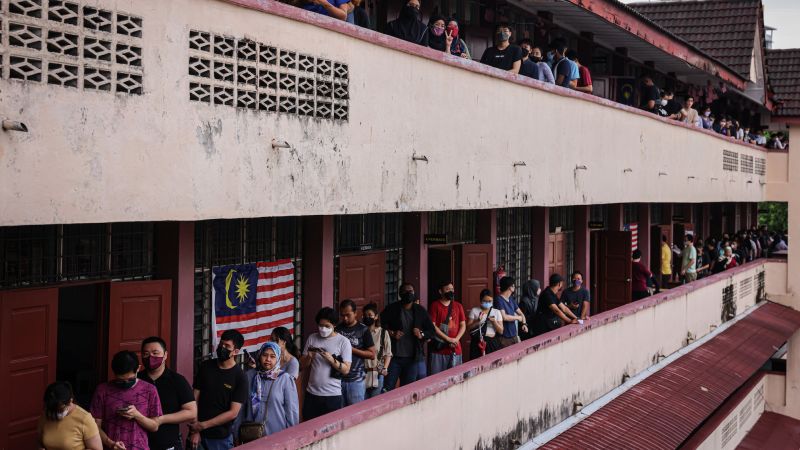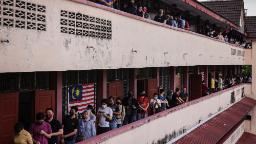

CNN
—
Malaysia is facing a hung parliament for the first time in its political history, after a divisive, tightly-contested general election left major parties unable to secure enough votes to form a new government.
The result has thrust the Southeast Asian country into fresh political turmoil, as rival leaders scramble to broaden collations in renewed efforts to form a clear majority. Whoever wins will become Malaysia’s fourth prime minister in as many years, as the country grapples with rising inflation and a cost of living crisis.
With all but one parliamentary seat declared Sunday morning, veteran opposition leader Anwar Ibrahim’s multi-ethnic Pakatan Harapan coalition was ahead, having secured 82 seats from a possible 220, according to results from the country’s Election Commission.
Close behind is former Prime Minister Muhyiddin Yassin’s Malay-based Perikatan Nasional, or National Alliance, with 73 seats. Muhyiddin’s group includes an Islamist party that has openly backed shariah or Islamic law.
But in the biggest upset of the night, Prime Minister Ismail Sabri Yaakob’s ruling Barisan Nasional (BN) coalition, made up of center right political parties including the dominant United Malays National Organisation (UMNO), suffered a stunning defeat – winning just 30 seats.
Officials from UMNO, which ruled Malaysia for more than six decades following its independence from Britain, previously told CNN the party had “a lot of work” to do and did not want to go backwards.
Once indomitable figures were also thrust out. The country’s former prime minister, 97-year-old Mahathir Mohamad suffered defeat for the first time in 53 years, losing his seat in the Langkawi island constituency.
The lack of a clear winner in Saturday’s election now presents the possibility Malaysia’s King could become involved, with the constitution granting the monarch power to determine who has the majority in parliament.
Both leading candidates declared victory on Sunday, despite results showing neither has enough votes to form a government.
In a late night speech to supporters Saturday, Anwar claimed he had enough support from members of parliament to form a government and would detail his support in a letter to the King. Muhyiddin also told his supporters he was in discussions with leaders of the Sabah and Sarawak political parties to also form a coalition.
Since 2015, Malaysian politics has been overshadowed by the 1MDB corruption scandal, which saw billions of dollars of taxpayers money embezzled out of the country. It brought down former prime minister, Najib Razak, who is now serving a 12-year prison sentence for corruption.
Ahead of the polls, many voters expressed a strong desire to end years of political instability. And on Saturday, voters headed to polls in huge numbers, with state media estimating turnout to be 73.89% – despite heavy rains and flooding which hindered campaigning across half of the country in recent weeks.
If Anwar is able to secure a coalition with enough votes to form a government, it would represent a remarkable comeback for the veteran politician, who was imprisoned for sodomy and released in 2018.
Anwar made his name as a student activist in various Muslim youth groups in Kuala Lumpur in the late 1960s, as the country reeled from the protracted Communist insurgency of the Malayan Emergency.
Arrested in 1974 in student protests against rural poverty, Anwar was sentenced to 20 months in jail. Despite his firebrand reputation, he later confounded liberal supporters in 1982 by joining the conservative United Malays National Organization (UMNO) led by Mahathir.
The freed politician was the heir apparent to then-premier Mahathir until 1998, when he was sacked and charged for corruption and sodomy. He was found guilty the following year, a ruling that led to mass street demonstrations.
The sodomy conviction was overturned, but the corruption verdict was never lifted, barring him from running for political post until a decade later.
In 2008, once his ban on political participation was lifted, he was hit with further sodomy charges.
Following an appeal of the acquittal of those charges he was convicted again and jailed in 2015. Human rights groups were highly critical when the conviction was upheld, calling it politically motivated – a claim the government denied.
Anwar was released three years later, immediately joining with one time political opponent Mahathir to oust the ruling Barisan party for the first time in Malaysia’s history. The success, however, was short lived, with the coalition collapsing after less than two years in power.
